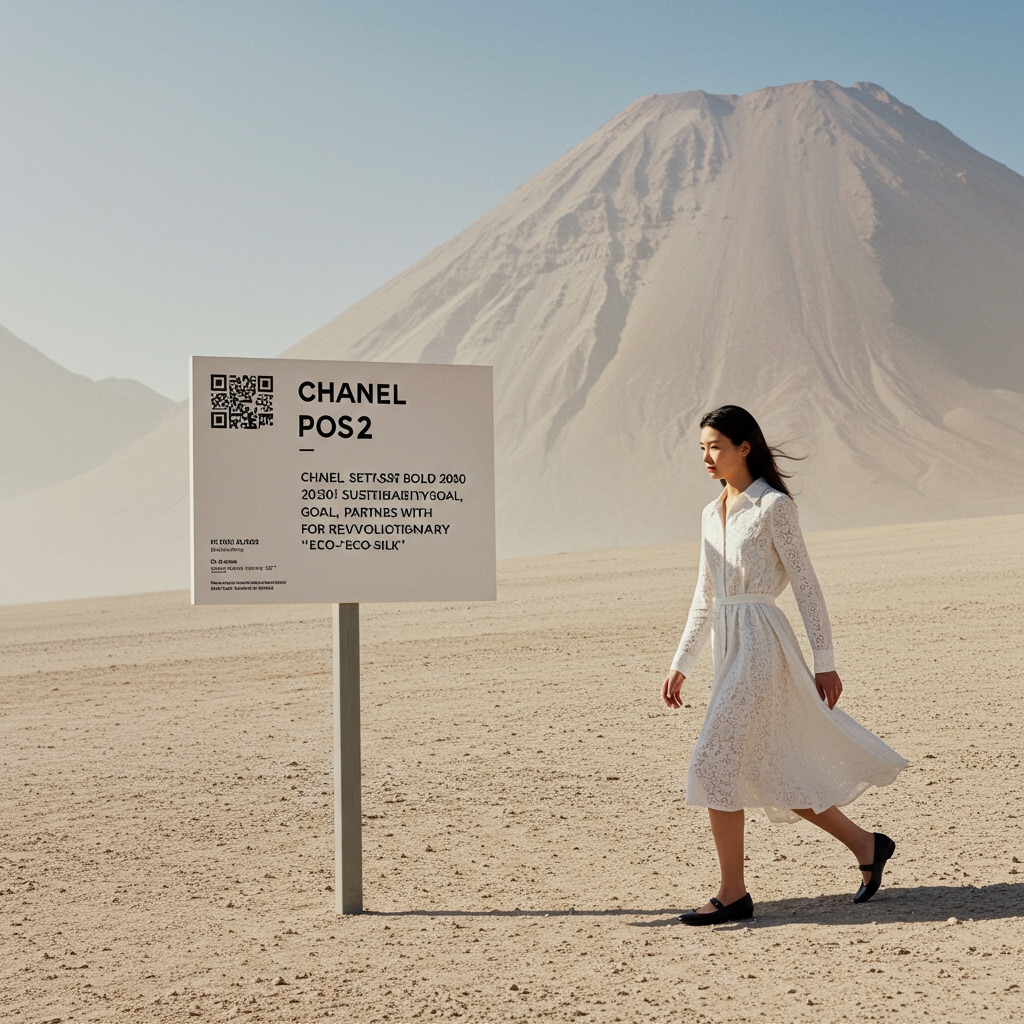Chanel Commits to 100% Sustainable Materials by 2030
Paris, France – Chanel, the iconic French luxury house, announced a significant strategic shift on Monday, unveiling an ambitious commitment to transition its entire product portfolio to 100% biodegradable or certified recycled materials by the year 2030. This landmark environmental pledge positions Chanel at the forefront of sustainability initiatives within the high-fashion and luxury goods sectors, signaling a deep integration of ecological responsibility into its core business model.
The comprehensive goal encompasses all facets of the brand’s vast production, from haute couture and ready-to-wear to accessories, leather goods, footwear, and potentially extending into other areas like packaging. Achieving 100% circularity or biodegradability within a decade presents substantial logistical, technological, and supply chain challenges, underscoring the magnitude of this corporate undertaking. It necessitates a fundamental re-evaluation and transformation of sourcing strategies, material development, and manufacturing processes across Chanel’s global operations.
Strategic Partnership with BioTex Innovations
Central to Chanel’s accelerated sustainability timeline is a newly formed strategic partnership with BioTex Innovations. Based in Zurich, Switzerland, BioTex Innovations is recognized as a leading biotech firm specializing in developing advanced, environmentally conscious materials through cutting-edge biotechnological processes. The collaboration leverages BioTex’s scientific expertise and innovative production capabilities to create next-generation textiles and materials aligned with Chanel’s stringent quality standards and ambitious ecological objectives.
The alliance represents a direct investment by Chanel in biotech innovation as a crucial pathway to decouple luxury production from traditional resource-intensive and potentially environmentally harmful methods. By partnering with a specialist in this field, Chanel aims to secure access to proprietary technologies and novel materials that meet both its sustainability targets and its exacting demands for luxury aesthetics, performance, and durability. This strategic move is indicative of a broader trend in the luxury industry where brands are increasingly looking towards science and technology to solve complex environmental challenges within their supply chains.
Unveiling ‘Eco-Silk’: The First Innovation
The first tangible fruit of the Chanel-BioTex partnership is the development of a novel textile dubbed ‘Eco-Silk’. This innovative material is produced not through traditional sericulture but via microbial fermentation, a biotechnological process where microorganisms are used to synthesize complex organic compounds, in this case, silk proteins. Microbial fermentation offers the potential for a more controlled, resource-efficient, and potentially scalable production method compared to conventional silk farming, which can have significant land, water, and ethical considerations.
The introduction of ‘Eco-Silk’ marks a significant step towards creating high-performance, luxurious materials with a reduced environmental footprint. Chanel has confirmed that this pioneering ‘Eco-Silk’ textile is slated for its debut in the brand’s Spring/Summer 2026 ready-to-wear collection. Its inclusion in such a prominent collection underscores Chanel’s confidence in the material’s quality, aesthetic appeal, and readiness for large-scale luxury application. The successful integration of ‘Eco-Silk’ will serve as a critical benchmark for future material innovations stemming from the BioTex collaboration.
Driving Forces: Regulation and Consumer Demand
Chanel’s bold sustainability announcement is intrinsically linked to two powerful external pressures: escalating environmental regulations, particularly within the European Union, and mounting global consumer demand for verifiable sustainable luxury goods. The European Union has been increasingly active in proposing and enacting legislation aimed at making fashion and textile products more sustainable, durable, and circular. These regulations often include requirements for extended producer responsibility, digital product passports providing traceability information, restrictions on harmful chemicals, and targets for recycled content.
For luxury brands with significant operations and sales in the EU, compliance with these evolving regulations is not optional but essential for continued market access and viability. Furthermore, there is growing consumer consciousness regarding the environmental and social impact of their purchasing decisions, particularly among younger demographics and in key luxury markets. Consumers are increasingly scrutinizing brands’ environmental claims and demanding transparency and authenticity regarding sustainability practices. They seek luxury products that not only embody craftsmanship and exclusivity but also align with their values concerning environmental stewardship and ethical sourcing.
Industry Implications and Future Outlook
Chanel’s 2030 commitment and its partnership with BioTex Innovations set a significant precedent within the luxury sector. Such an ambitious target from a brand of Chanel’s stature is expected to exert pressure on peers to accelerate their own sustainability efforts. It highlights the growing understanding that sustainability is no longer merely a corporate social responsibility add-on but a critical component of long-term business strategy and brand value.
The reliance on biotechnological innovation, exemplified by the ‘Eco-Silk’ project, signals a potential paradigm shift in how luxury materials are conceived, sourced, and produced. It suggests a future where high-end textiles and components are increasingly lab-grown or synthesized through low-impact biological processes rather than relying solely on traditional agricultural or petrochemical sources. While challenges remain in scaling up such technologies and ensuring cost-effectiveness while maintaining luxury standards, Chanel’s investment indicates a serious commitment to exploring these avenues.
The success of this initiative will depend on effective collaboration across Chanel’s complex supply chain, continued technological advancements by partners like BioTex Innovations, and clear communication with consumers about the value and verification of these sustainable materials. As the 2030 deadline approaches, the industry will closely watch Chanel’s progress as a benchmark for achieving meaningful, verifiable sustainability within the demanding world of luxury.





